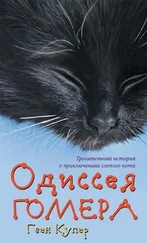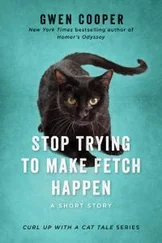I felt a bit like a character in a scary movie as I headed in the direction the vet tech had indicated—some not-very-bright girl inexplicably walking toward the room containing the terrifying monster, rather than away from it. I’d known that the sounds I’d heard in the waiting room would only grow louder as I approached their source, but it was still unnerving to hear how much louder they became.
The tableau that greeted me when I reached Homer’s exam room might have been comical under different circumstances. Standing in a semicircle—facing the high metal exam table bolted to the wall, but at a judicious distance from it—were three women. One was the doctor, who must have been new to the practice, because I’d never seen her before. The other two were clearly assistants. They’d donned long, thickly padded gloves that stretched from the tips of their fingers all the way up to their shoulders, like the ones that falconers wear. They’d also knotted bandanas behind their ears and pulled them up protectively over their faces. Their foreheads above the bandanas were a vivid pink and beaded with sweat. Their bodies were poised with a tense wariness, leaning slightly forward at the shoulders while their feet were half-turned in the opposite direction, ready to carry them back to a safer distance if the need arose.
Seeing Homer—all four pounds of him, crouched defensively on the exam table—took me back instantly, all the way to that summer night more than twelve years earlier, when a Homer I hadn’t recognized had chased a large male intruder right out of our Miami apartment. If he’d looked helpless and fragile a half-hour ago, when I’d first brought him in to the clinic, he now more closely resembled the panther the woman in the waiting room had thought she’d heard. The hind part of his body was elevated and his chest was lowered until it almost touched the table beneath him. His head was raised with his mouth wide open, lips pulled back in a cruel rictus that bared all his teeth. His head and ears moved evenly from side to side as he listened for a cue as to where the next assault might come from, one paw raised with claws at full extension, ready to lash out as soon as someone came within striking distance.
One of the assistants was holding a yellowish hand towel in front of her, the way a lion tamer might hold a chair between himself and the roaring lion before him. As I entered, the assistant—still maintaining a safe distance between herself and Homer—gingerly tossed it over his head. Homer immediately erupted into a fresh round of anguished, deafening roars, thrashing angrily as his claws attempted to escape the towel and find his tormentors.
I knew that putting a towel over the head of a distressed cat was standard procedure, that it usually calmed them, and that the hot bolt of rage that stabbed from my chest to my belly was therefore unwarranted. Everybody in that room wanted only to help Homer. Still, it took a wrenching effort of will to make my voice sound as serene as it needed to, for Homer’s sake.
“Okay, so Homer is blind.” I said Homer in the gentle, sing-song cadence I used at home when I was particularly happy with him. The wild thrashing beneath the towel stilled. “Putting a cloth over his head isn’t going to quiet him the way it does other cats. You’re just making him more upset.”
The assistant who’d thrown the towel now leaned forward and, grabbing the corner closest to her and farthest from Homer’s claws, quickly pulled it off while simultaneously taking a large step back. The Homer thus revealed, puffed up to several times his normal size, bore little resemblance to the Homer I knew. Nevertheless, his ears had pricked up and turned toward my voice. Once freed from the towel, his nose followed, rising inquisitively in an attempt to discern whether there was a familiar scent to match the familiar cadence.
“You’re a good boy, Homer.” I approached him slowly, my hands raised in front of me in an instinctive gesture of non-threatening compliance that was, of course, wasted on a blind cat. Cautiously, I put one hand directly beneath his nose.
Homer immediately pressed his whole face into my cupped palm, and I used the other hand to rub gently behind his ears. As frightening as it had been to see Homer in his rage, my heart nearly broke now to see him morph back into his normal self—just a scared little cat, terrified out of his wits at being separated from the human he trusted. “You’re a good boy, Homer, a good, good boy,” I repeated soothingly, and Homer’s fur sank as his entire body seemed to relax.
If I’d levitated into the air right in front of them, the vet and her assistants couldn’t have appeared more gobsmacked as Homer transformed from snarling beast to docile housecat in my hands. “I’m sorry,” the vet said. “With the way he was brought in, we didn’t know he’d put up such a fight.”
I told you so! I told you so! a voice in my brain shrieked. But I only laughed ruefully and said, “I understand. It is hard to believe that such a little guy can make such a big ruckus.”
“He’s so teeny! ” one of the assistants exclaimed almost indignantly, as if she’d been trying to restrain herself but couldn’t hold it in any longer—couldn’t quite fathom how one small cat, and a sick one at that, had been able to cause three grown women who handled animals for a living to fear legitimately for their physical safety.
“Maybe you should spend a few minutes alone with him,” the vet said now. “It looks like we’ll have to sedate him before we can examine him. That might go easier if he’s a little calmer before I try to inject him.”
“That’s a good idea,” I said. “Is it okay if I sit on the floor?”
At her nod, I sat down cross-legged about a foot from the exam table. “Come here, Homer-Bear,” I said, and Homer leapt a touch awkwardly from the table to the ground. In the crouched, creeping way of an animal that suspects it’s being hunted, he made his way over to where I sat and crawled into my lap. The three women, still shaking their heads in amazement, filed silently out of the room.
Homer and I sat there for long minutes as I continued to stroke him. He didn’t purr, and he didn’t fall asleep, but he did fall into a calm, quiet reverie. My poor boy, I thought. My poor, poor boy. At this point, I felt well beyond guilty and heartily sorry that I’d brought Homer in at all, knowing how very traumatic the vet always was for him—although what choice had I had? Eventually, the vet returned and knelt over us just long enough to jab a needle into the back of Homer’s neck. Homer instantly hissed and reared up, trying to catch her with his front claws. But the sedative kicked in pretty quickly, and Homer fell unconscious back into my lap.
“We can take it from here,” the vet said, lifting Homer and bundling him back into his carrier. “We’ll draw blood and run some tests. I’ll let you know when he’s ready to leave.”
Laurence and I had to wait another half hour before we were able to bring a still-sedated Homer back home. I was given some instructions on how to care for him and things to watch for until the sedative wore off. “Do you know what caused him to fall over like that this afternoon?” I asked. After all the drama of the preceding hour, the thing that had brought us there in the first place seemed almost like an afterthought, like something that had happened years ago to somebody else.
“We’ll know more when the bloodwork comes back tomorrow,” the vet told me. “We’ll call you as soon as we have it. The important thing now is for him to get some rest.”
HOMER SLEPT FOR the rest of the afternoon. He didn’t stir into consciousness again until early evening, when he woke just long enough to eat his dinner before staggering back into the bedroom and collapsing in the little nest I’d made for him on the floor from old t-shirts and sweaters. I moved his litter-box into our bedroom and kept him in there with us overnight, away from the curious noses of Clayton and Fanny, who couldn’t figure out why their big brother smelled so different (like the vet’s office, although they didn’t know it), and why he didn’t wake and acknowledge them, even when they touched his head and face with tentative little paws. At some point in the middle of the night, Homer made an unsuccessful attempt to jump onto the bed but fell over backwards, the sedative having still not worn off entirely. I didn’t want him on the bed—which, being a king-size, was rather high off the ground—because I wasn’t sure he’d be able to jump off without hurting himself if he needed his litter-box. But I also didn’t want him to have to sleep by himself. I ended up moving my pillows and a blanket down to the floor, so I could curl up next to him.
Читать дальше












